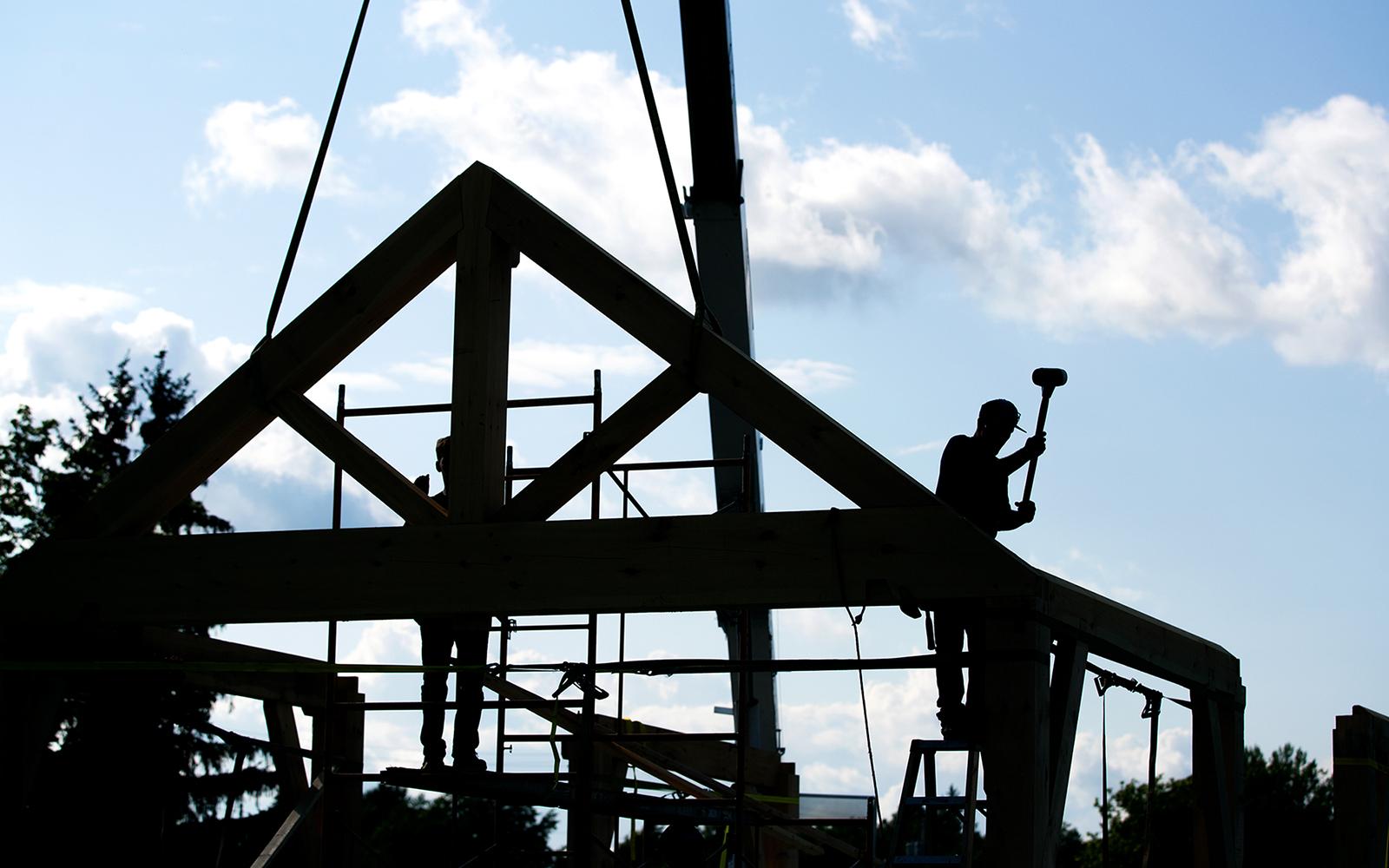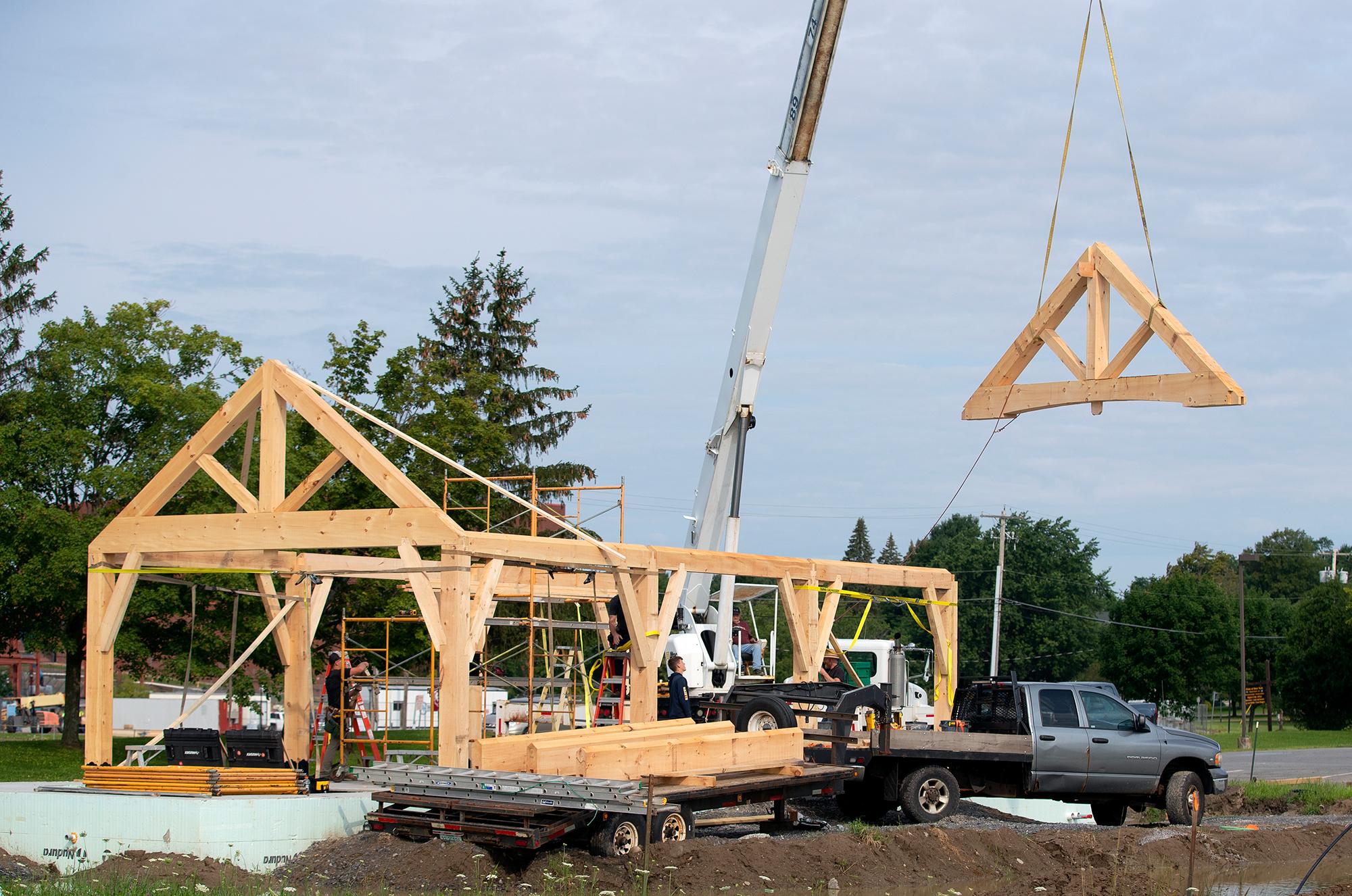SUNY Potsdam Constructs Donor-Funded Handcrafted Experiential Archaeological Research and Teaching Hub (HEARTH)

Tim Lapka is silhouetted against the evening sky while overseeing the construction of SUNY Potsdam’s new Handcrafted Experiential Archaeological Research and Teaching Hub (HEARTH) building, using timber framing methods.
Master carpenters have been hard at work this week raising posts and trusses using the traditional timber framing method at a new donor-funded facility at SUNY Potsdam. Once completed, the SUNY Potsdam Handcrafted Experiential Archaeological Research and Teaching Hub (HEARTH) will be a heritage-based living laboratory designed for use by both campus and community, dedicated to teaching traditional skills in hands-on workshops.
The timber-frame structure made from local white pine will surround a traditional circa 1800s-style brick oven, with a large hands-on classroom space and outdoor patios on either side. The HEARTH project was envisioned by faculty from SUNY Potsdam’s Department of Anthropology, and has been funded entirely through the generosity of supportive donors, including gifts of materials and in-kind support from businesses both near and far. SUNY Potsdam hopes to complete construction and hold the first classes and workshops there this fall.
“HEARTH is inspired by the past—through the size and shape and layout—but built for today and the future,” said Associate Professor of Archaeology Dr. Timothy Messner, as he pitched in at the project site. “In the past, we’ve been limited by space. We can’t do a lot of hands-on, dirty kinds of things, like tanning hides or fermenting apples, in our existing labs. So this is going to be a gamechanger in terms of what we can do with our students.”
The space is designed to host classes and workshops led by master craftspeople and SUNY Potsdam faculty, showcasing traditional skills and heritage artistry, such as blacksmithing, stone masonry, weaving, tanning, beading, traditional building and more. Mirroring that approach, local experts are leading the building’s construction and design using heritage methods.

“Tim Lapka, our master carpenter on the project, has brought his skills and gifts to the project and has crafted this masterpiece. Our renowned stone mason, Mark Seymour, is going to be building this magnificent hearth that’s based on 19th century homes in the area, where you have a huge fireplace on the righthand side, and then on the left will be a bread oven. The fireplace itself will be outfitted with cooking hardware, so James Gonzalez, an accomplished blacksmith, will be building the crane and a lot of the hardware, andirons and shovels, and we’ll be doing historic cooking classes in the HEARTH too,” Messner said.
HEARTH is the first initiative launched under the umbrella of the newly-established Marqusee Center for Archaeology and Anthropology, a publicly facing teaching and learning center focused on the preservation and revitalization of cultural heritage. The center is named in honor of Dean Emeritus Dr. Steven J. Marqusee (Hon. ’19), a longtime archaeology faculty member who retired in 2019 after a 43-year career at the College, including a decade as dean of SUNY Potsdam’s School of Arts and Sciences.
The Marqusee Center was established thanks to a generous leadership gift from Donald (Hon. ’54) and Kathryn Kofoed Lougheed ’54, and support from other alumni, faculty and friends of the department. In total, the funds raised exceed $500,000, and will go toward the construction of HEARTH and to support programs there.
Once open, HEARTH will sponsor a regular craftsperson-in-residence program throughout the year, where experts in a range of traditional heritage crafts will share their knowledge through workshops and presentations to SUNY Potsdam students, children from local schools, and the wider public. The endowed fund that is being established with past and future donations will support this and other outreach programs, and provide needed materials and tools going forward.
“I am so excited to see our students have a new facility where they can gain incredible and innovative learning experiences that are harder to make happen in our traditional classroom environments,” said Dr. Hadley Kruczek-Aaron, chair of the SUNY Potsdam Department of Anthropology. “HEARTH builds on the department’s longtime emphasis on applied learning, which we know helps to make our students better archaeologists and anthropologists, and helps prepare them for careers in museums, historic preservation, education, heritage tourism, cultural resource management, business, and much more. We couldn’t be more grateful to the Lougheeds and all of the many other donors and supporters, whose generosity will benefit not just our students but learners of all ages in the North Country and beyond.”
One of the first classes that Messner is looking forward to teaching in the new facility is a one-credit course in crafting hard cider. Students will learn about the cultural history of hard cider in New York State and the world, while actually pressing and fermenting apples themselves using classic methods. It’s one of many experimental anthropology courses that Messner has led to teach students firsthand about ancient crafts, skills and foodways, including through building a dugout canoe, tapping campus trees to make maple syrup, and more.
“Our contemporary world is defined in part by consumerism and disposability. Our lives are inundated by innumerable consumer goods. Yet most of us only have a superficial knowledge of the material items that define our lives. We do not know how they are produced, by whom, and at what cost—socially, ecologically, and economically,” Messner said. “At the same time, there is a growing interest in the work of traditional artisans and craftspeople—such as woodworkers, blacksmiths, leather tanners and traditional builders. However, the knowledge base of these experts is at risk of being lost because of limited mentorship and educational opportunities. I see HEARTH as helping to address this problem.”
The mission of SUNY Potsdam’s Department of Anthropology is to provide students with knowledge of the five fields of anthropology and to give them practical experience in communities so that they can approach the world professionally and anthropologically. The College’s archaeological studies program offers students a chance to gain hands-on field experience working alongside experienced faculty as undergraduates. Past field school projects have included work in the North Country and the Adirondacks, and as far away as South Africa. To learn more, visit https://www.potsdam.edu/academics/AAS/Anthro.
About SUNY Potsdam:
Founded in 1816, The State University of New York at Potsdam is one of America’s first 50 colleges—and the oldest institution within SUNY. Now in its third century, SUNY Potsdam is distinguished by a legacy of pioneering programs and educational excellence. The College currently enrolls approximately 3,600 undergraduate and graduate students. Home to the world-renowned Crane School of Music, SUNY Potsdam is known for its challenging liberal arts and sciences core, distinction in teacher training and culture of creativity. To learn more, visit www.potsdam.edu.
